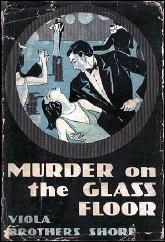Wed 25 May 2011
Reviewed by William F. Deeck: VIOLA BROTHERS SHORE – The Beauty-Mask Murder.
Posted by Steve under Authors , Reviews[8] Comments
William F. Deeck
VIOLA BROTHERS SHORE – The Beauty-Mask Murder. Richard R. Smith, US, hardcover, 1930, 384 pages. UK: John Hamilton, hc, 1932, as The Beauty-Mask Mystery.
Luckily for the innocent suspects in this case, Gwynn Leith is in Hanaford visiting her brother, His Honor the Mayor. If it had been left to the mayor and the police, a whole series of suspicious characters would have been arrested for the multiple murder — by an overdose of morphine; poison, and throat slitting — of an extremely unpleasant woman who was also most unattractive at the time of her death.
A widow of uncertain age, Leith is a most intelligent woman with a low opinion of the male mentality. She is, as it were, an early feminist. Her involvement in the case keeps the innocent from being prosecuted by official stupidity. As she says:
Where Hanaford is located, I don’t know. A little research should find it, for it’s in a state in which the Grand Jury determines guilt or innocence. There can’t be many of those.

Bio-Bibliographic Notes: Included in the Revised Crime Fiction IV, by Allen J. Hubin, is one other book by Viola Brothers Shore: Murder on the Glass Floor (Long & Smith, 1932). The most interesting Gwynn Leith is a character in it also, but so is someone called Colin Keats, a fellow whose appearance in The Beauty-Mask Murder Bill Deeck did not happen to mention.
An online website devoted to Jewish authors has a page with a long biography of the author, Viola Brothers Shore (1890-1970), from which I excerpt the following:
“Shore wrote silent movie titles and original stories for many motion pictures including The Kibitzer (1929) and Walking on Air (1936). […] She wrote numerous mystery stories, including The Beauty Mask Murder (1930) and Murder on the Glass Floor (1932) and won several Ellery Queen awards.”
May 25th, 2011 at 8:33 am
POOOH, feminism and the denigration of males is not for me, thanks !
May 25th, 2011 at 9:04 am
I first became aware of Viola Brothers Shore when I read her short story featuring Gwynn Leith, THE MACKENZIE CASE, in MS MURDER- The Best Mysteries Featuring Women Detectives by the Top Women Writers, edited by Marie Smith.
I found the story funny, entertaining and the best of the book.
She wrote in a variety of forms from the old slicks such as SATURDAY EVENING POST to movies such as BREAKFAST FOR TWO (1937). She has a bio at IMDb and the Jewish Women Encyclopedia. She had an obit in the New York TIMES and VARIETY.
I look forward to reading more by her and about her.
May 25th, 2011 at 4:30 pm
Not exactly a rave, given the Grand Jury comments, but the character’s sentiments should make her a candidate for women’s studies revival. Maybe, like Leslie Ford and Mignon Eberhart, she’ll be elevated above Ellery Queen within the mystery genre.
May 25th, 2011 at 7:44 pm
You aroused a smile from me there, Curt, but I think the book might be fun to read, stupid cops and all. (I have one of the two she wrote, that I’m sure of, but at the moment I don’t remember which one, being boxed away and uncatalogued. The book, I mean.)
May 26th, 2011 at 1:24 am
I bought a copy of this title earlier this year–it’s on the never-ending to-read list!
May 26th, 2011 at 8:39 pm
When I was growing up in Mishawaka, Ind there was a old-fashion shoe store and shoe repair called “Viola Brothers.” I always assumed it was just the name of the original proprietors but just recently I heard of this Viola Brothers Shore and wonder if the shoe store was named after her.
May 26th, 2011 at 9:10 pm
According to the link I found, Viola Brothers the author was born in Manhattan, grew up there, married someone named Shore, divorced him, married someone else and moved to Hollywood before moving back to NYC. Probably only passed through Mishawaka on the train!
Funny what you remember. The two competing shoe stores in Cadillac (MI) where I grew up were Henne’s and Schoff’s. Both long gone now.
May 26th, 2011 at 10:28 pm
Google the name Viola Brothers gets you some companies (but no shoe store that I saw). My favorite part of Viola’s bio is how she got to New York to be born.
While in the New Orleans area, Daddy killed a man who attacked Mom who was pregnant with the soon to be Viola. Daddy escaped and later still pregnant Mom to be escaped up river in a canoe paddled by a native American.
She was in Hollywood working in the silent film business when it was just an excuse for “parties”. She wrote for films, books, magazines and lived a life seemly more interesting than anything she wrote.
Oh, a couple of thoughts about that quoted paragraph. Isn’t one of the most common reasons the amateur has to become a detective is the police are stupid? And have you ever met any woman who does not think men would be better off if they listened to women?